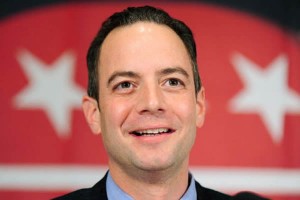National
New GOP chair backs ban on same-sex marriage
Log Cabin is hopeful Priebus will support ‘big tent’ policy

Reince Priebus of Wisconsin was elected the new RNC chair. He has supported the GOP platform language opposing same-sex marriage and also supported a ban on civil unions. (Photo courtesy of Wisconsin GOP)
The head of Log Cabin Republicans said he is hopeful that the newly elected chair of the Republican National Committee, Reince Priebus of Wisconsin, would maintain cordial relations with LGBT Republicans, even though Priebus supports a constitutional ban on same-sex marriage.
Priebus, 38, chair of the Wisconsin Republican Party, defeated controversial RNC Chair Michael Steele and four other candidates in a hotly contested race for the RNC leadership post at an RNC meeting in suburban Maryland on Jan. 14.
In a Jan. 3 debate at the National Press Club in Washington, Priebus, Steele and the three other candidates for the RNC chair position each said they believe marriage should be restricted to a union between a man and a woman.
“I don’t believe that judges can rewrite the Constitution and redraft what marriage is,” Priebus said during the debate. “I think…there’s a sanctity of marriage…I believe my kids and believe children should grow up with one father and a mother if possible,” he said.
He then added, “I don’t believe anybody should be denied dignity in this discussion, everyone should be loved. But at the end of the day, I believe that marriage, through the sanctity of marriage, should be between one man and one woman.”
In an earlier interview broadcast on YouTube with Maggie Gallagher, president of the National Organization for Marriage, the leading group opposing same-sex marriage, Priebus said he supports the Republican Party platform position on marriage, which calls for a constitutional amendment to ban same-sex marriage.
He also noted in his interview with Gallagher, which took place shortly after he entered the race for RNC chair, that he was a strong advocate for the Wisconsin state constitutional amendment banning both same-sex marriage and civil unions. Voters in the state approved that amendment in 2006.
“I was a part of that,” he said. “I was helpful to make sure that that happened…It’s an important issue because I believe marriage is a gift from God and the sanctity of marriage ought to be protected,” he told Gallagher.
“I believe the Defense of Marriage Act is important,” he continued in the interview. And it’s something that certainly as chairman of the Republican National Committee that we ought to be committed to.”
In marked contrast, the Democratic Party platform expresses opposition to both a constitutional ban on same-sex marriage and the Defense of Marriage Act, or DOMA, which it calls for repealing.
DOMA, which Congress passed in 1996, defines marriage under federal law as a union only between a man and a woman. The law prevents same-sex couples married in states that have legalized such unions from receiving any federal benefits or rights related to marriage.
The GOP platform also recognizes “the incompatibility of homosexuality with military service” while the Democratic platform called for the repeal of the “Don’t Ask, Don’t Tell” law barring gays and lesbians from serving openly in the military.
The subject of gays in the military did not come up in the debate among RNC chair candidates or in Gallagher’s interview with Priebus. But in discussing the GOP platform, Priebus told Gallagher, “I have no beef with any part of that platform that’s set forth within the Republican National Committee.”
R. Clarke Cooper, executive director of Log Cabin Republicans, joined other GOP leaders in releasing a statement on the day Priebus was elected RNC chair calling for party unity and inclusion.
“As Chairman Priebus stated, ‘we must come together over common interests. We must unite,’” Cooper said in his statement.
“I look forward to continuing our successful partnership with the Republican National Committee, and urge Chairman Priebus to continue the Committee’s strong record of coalition-building, which was an important part of GOP success in 2010,” he said.
Cooper said Log Cabin did not take sides in the RNC chair race. He said he personally supported one of the candidates but declined to say which one.
GOProud, a national organization representing “gay conservatives and their allies,” called Priebus’ election as party chair “a good day for conservatives and for the Republican Party.”
Christopher Barron, chair of GOProud’s board, said the group worked hard for Steele’s defeat but did not say if it backed another candidate. GOProud was among a number of conservative groups that criticized Steele for making a statement last year saying the U.S. could not achieve its objectives in the war in Afghanistan.
“Michael Steel’s tenure as chairman can only fairly be characterized as an unmitigated disaster,” Barron said “Were it not for the hard work of outside groups, who were forced to step in to fill the void left by an ineffective RNC, success at the ballot box in November would not have happened.
Robert Kabel, the gay chair of the D.C. Republican Committee, had a far different view on Steele, saying the now ex-GOP chair did an overall good job.
Kabel said he backed Steele’s re-election bid, saying Steele was “highly supportive” of the D.C. Republican Party and of Kabel’s role as the nation’s only out gay leader of a state or local Republican Party committee.
Kabel, who is a member of the RNC, said he voted for former RNC official Maria Cino, another of the candidates competing for the chair post, when Steele dropped out of the race after trailing Priebus in the fourth round of voting.
Cooper noted that Steele had welcomed Log Cabin and gay Republicans in general into the RNC’s fold during his two-year tenure as RNC chair and hired at least one out gay staffer to work at the RNC’s Coalitions Department, which reached out to Republican constituency groups like College Republicans, Young Republicans, and Log Cabin.
Kabel, who like Cooper, declined to identify the gay staffer, said the staffer is among nearly a dozen RNC staff members that Priebus fired or who resigned during his first week in office.
Both said the firings and resignations were part of the normal personnel changes that take place whenever a new party chair takes office.
The Hill newspaper reported that Priebus dismissed most of the staff that had been hired by Steele to work on the 2012 Republican National Convention.
“They recognized the gay community, they were very open to Log Cabin and they were really delighted when Clarke Cooper was finally selected as the new Log Cabin director,” Kabel said of the RNC Coalitions Department under Steele’s tenure.
Cooper said he could not say for sure but he expected Priebus to keep the Coalitions Department in place, although he said the new party chair might rename it or change its place within the RNC structure.
A staff member with the RNC’s press office, who identified himself only as Michael, said he would seek to obtain a response to a Blade inquiry about Priebus’ plans for the Coalitions Department and its interaction with Log Cabin. The staffer did not get back by press time.
Priebus led in the balloting in a protracted election in which the 168-member RNC was unable to deliver the 85 votes needed to elect a chair until Priebus finally obtained 97 votes on the seventh round of voting.
In addition to Steele, the other candidates in the race were Cino, a former Bush administration official who had been friendly to Log Cabin; Ann Wagner of Missouri; and Saul Anuzis of Michigan.
In a related development, on the same day Priebus won his race for RNC chair, the RNC elected D.C. resident and longtime Republican activist Tony Parker as RNC treasurer, which is considered the second most important post at the RNC. Parker has held the position of Republican National Committeeman from D.C. His views on LGBT issues could not be immediately determined.
On Jan. 6, the D.C. Republican Committee voted unanimously to re-elect Kabel as chair for another two-year term.
U.S. Supreme Court
Supreme Court to consider bans on trans athletes in school sports
27 states have passed laws limiting participation in athletics programs

The U.S. Supreme Court on Thursday agreed to hear two cases involving transgender youth challenging bans prohibiting them from participating in school sports.
In Little v. Hecox, plaintiffs represented by the ACLU, Legal Voice, and the law firm Cooley are challenging Idaho’s 2020 ban, which requires sex testing to adjudicate questions of an athlete’s eligibility.
The 9th U.S. Circuit Court of Appeals described the process in a 2023 decision halting the policy’s enforcement pending an outcome in the litigation. The “sex dispute verification process, whereby any individual can ‘dispute’ the sex of any female student athlete in the state of Idaho,” the court wrote, would “require her to undergo intrusive medical procedures to verify her sex, including gynecological exams.”
In West Virginia v. B.P.J., Lambda Legal, the ACLU, the ACLU of West Virginia, and Cooley are representing a trans middle school student challenging the Mountain State’s 2021 ban on trans athletes.
The plaintiff was participating in cross country when the law was passed, taking puberty blockers that would have significantly reduced the chances that she could have a physiological advantage over cisgender peers.
“Like any other educational program, school athletic programs should be accessible for everyone regardless of their sex or transgender status,” said Joshua Block, senior counsel for the ACLU’s LGBTQ and HIV Project. “Trans kids play sports for the same reasons their peers do — to learn perseverance, dedication, teamwork, and to simply have fun with their friends,” Block said.
He added, “Categorically excluding kids from school sports just because they are transgender will only make our schools less safe and more hurtful places for all youth. We believe the lower courts were right to block these discriminatory laws, and we will continue to defend the freedom of all kids to play.”
“Our client just wants to play sports with her friends and peers,” said Lambda Legal Senior Counsel Tara Borelli. “Everyone understands the value of participating in team athletics, for fitness, leadership, socialization, and myriad other benefits.”
Borelli continued, “The U.S. Court of Appeals for the Fourth Circuit last April issued a thoughtful and thorough ruling allowing B.P.J. to continue participating in track events. That well-reasoned decision should stand the test of time, and we stand ready to defend it.”
Shortly after taking control of both legislative chambers, Republican members of Congress tried — unsuccessfully — to pass a national ban like those now enforced in 27 states since 2020.
Federal Government
UPenn erases Lia Thomas’s records as part of settlement with White House
University agreed to ban trans women from women’s sports teams

In a settlement with the Trump-Vance administration announced on Tuesday, the University of Pennsylvania will ban transgender athletes from competing and erase swimming records set by transgender former student Lia Thomas.
The U.S. Department of Education’s Office for Civil Rights found the university in violation of Title IX, the federal rights law barring sex based discrimination in educational institutions, by “permitting males to compete in women’s intercollegiate athletics and to occupy women-only intimate facilities.”
The statement issued by University of Pennsylvania President J. Larry Jameson highlighted how the law’s interpretation was changed substantially under President Donald Trump’s second term.
“The Department of Education OCR investigated the participation of one transgender athlete on the women’s swimming team three years ago, during the 2021-2022 swim season,” he wrote. “At that time, Penn was in compliance with NCAA eligibility rules and Title IX as then interpreted.”
Jameson continued, “Penn has always followed — and continues to follow — Title IX and the applicable policy of the NCAA regarding transgender athletes. NCAA eligibility rules changed in February 2025 with Executive Orders 14168 and 14201 and Penn will continue to adhere to these new rules.”
Writing that “we acknowledge that some student-athletes were disadvantaged by these rules” in place while Thomas was allowed to compete, the university president added, “We recognize this and will apologize to those who experienced a competitive disadvantage or experienced anxiety because of the policies in effect at the time.”
“Today’s resolution agreement with UPenn is yet another example of the Trump effect in action,” Education Secretary Linda McMahon said in a statement. “Thanks to the leadership of President Trump, UPenn has agreed both to apologize for its past Title IX violations and to ensure that women’s sports are protected at the university for future generations of female athletes.”
Under former President Joe Biden, the department’s Office of Civil Rights sought to protect against anti-LGBTQ discrimination in education, bringing investigations and enforcement actions in cases where school officials might, for example, require trans students to use restrooms and facilities consistent with their birth sex or fail to respond to peer harassment over their gender identity.
Much of the legal reasoning behind the Biden-Harris administration’s positions extended from the 2020 U.S. Supreme Court case Bostock v. Clayton County, which found that sex-based discrimination includes that which is based on sexual orientation or gender identity under Title VII rules covering employment practices.
The Trump-Vance administration last week put the state of California on notice that its trans athlete policies were, or once were, in violation of Title IX, which comes amid the ongoing battle with Maine over the same issue.
New York
Two teens shot steps from Stonewall Inn after NYC Pride parade
One of the victims remains in critical condition

On Sunday night, following the annual NYC Pride March, two girls were shot in Sheridan Square, feet away from the historic Stonewall Inn.
According to an NYPD report, the two girls, aged 16 and 17, were shot around 10:15 p.m. as Pride festivities began to wind down. The 16-year-old was struck in the head and, according to police sources, is said to be in critical condition, while the 17-year-old was said to be in stable condition.
The Washington Blade confirmed with the NYPD the details from the police reports and learned no arrests had been made as of noon Monday.
The shooting took place in the Greenwich Village neighborhood of Manhattan, mere feet away from the most famous gay bar in the city — if not the world — the Stonewall Inn. Earlier that day, hundreds of thousands of people marched down Christopher Street to celebrate 55 years of LGBTQ people standing up for their rights.
In June 1969, after police raided the Stonewall Inn, members of the LGBTQ community pushed back, sparking what became known as the Stonewall riots. Over the course of two days, LGBTQ New Yorkers protested the discriminatory policing of queer spaces across the city and mobilized to speak out — and throw bottles if need be — at officers attempting to suppress their existence.
The following year, LGBTQ people returned to the Stonewall Inn and marched through the same streets where queer New Yorkers had been arrested, marking the first “Gay Pride March” in history and declaring that LGBTQ people were not going anywhere.
New York State Assemblywoman Deborah Glick, whose district includes Greenwich Village, took to social media to comment on the shooting.
“After decades of peaceful Pride celebrations — this year gun fire and two people shot near the Stonewall Inn is a reminder that gun violence is everywhere,” the lesbian lawmaker said on X. “Guns are a problem despite the NRA BS.”


















